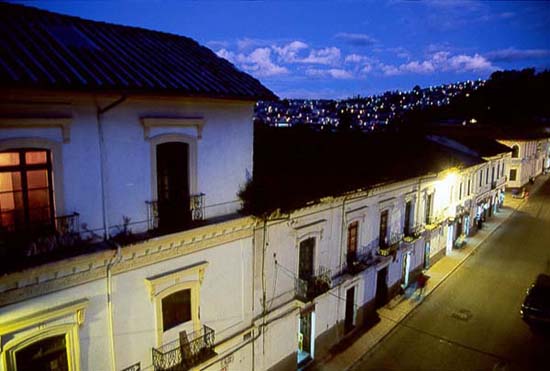
My sister is a soldier in the war on terrorism. Liz and Earl work for a less-widely known agency within the executive branch of the U.S. government: the Peace Corps.
Thoughts on war, peace
By Lisa Miller
My sister is a soldier in the war on terrorism.
She and her husband have been in Ecuador since February, learning Spanish and preparing to move to San Cristobal, one of the Galapagos Islands.
They are not affiliated with the armed forces, although the Galapagos Islands were once a U.S military base. No, Liz and Earl work for a less-widely known agency within the executive branch of the U.S. government: the Peace Corps.
I've thought of them often these last four weeks, as I've struggled to reconcile my mixed feelings about the war in Iraq.
——
My sister came into the world fighting, and she has never stopped. She was born two months premature, and the doctors warned our parents she might not survive.
They didn't know about her stubborn streak.
All her life, Liz has gone her own way, quietly working to do what she thought was right. She was active in Girl Scouts and organized her first community service project, a blood drive, as a teenager. She and Earl met as college-student volunteers with Habitat for Humanity.
Liz did her first Peace Corps stint after college, in Mali, where she lived alone in a small hut, taught schoolchildren about the environment and organized community agriculture projects.
In May, she and Earl will begin their service in San Cristobal. Working with the Charles Darwin Foundation, Liz will train teachers in environmental education, and Earl will do soil conservation and agroforestry projects with groups of children and farmers.
With each person they meet, they will dispel negative stereotypes of Americans. In the post-9/11 world, their role has never been more important.
——
I was opposed to the war before it started. I believed there was some justification for it, but I hoped the U.S. and British governments would get U.N. backing before launching an unprovoked attack on a sovereign nation.
Once the war began, things got blurry.
I watched the grainy, green footage of Baghdad under attack. I heard the pops as the bombs fell — and the dramatic music as the news anchors talked about it. I scanned the CNN crawl for the latest headlines and devoured newspaper articles for the rest of the story. But sifting through the propaganda was a challenge.
I wanted to know how smart our "smart" bombs really were. I wanted to know if the people of Iraq saw us as liberators or invaders. I wanted to know if Saddam really did have weapons of mass destruction, and if he was planning to use them.
——
Liz and Earl, meanwhile, were trying to persuade their host family that not all Americans are pro-war. In an e-mail a week after the war started, Liz explained why most people in Ecuador were against the war.
"They definitely see the U.S. as sort of a world bully," she wrote, "and don't understand why we're there in the first place and what we really think we'll get out of it."
——
As the coalition troops moved closer to Baghdad, the war became more complicated than "with us or against us."
I saw interviews with Iraqi Americans about the horrors of seeing relatives tortured and killed. I saw footage of Iraqis waving white flags, embracing American soldiers and tearing down statues of Saddam Hussein.
In those moments, in my gut, I felt we were doing the right thing.
But I'd still wonder: How many dead Iraqis would it take to liberate one city? How many confirmed weapons of mass destruction would it take to justify the war in the eyes of France or Russia?
——
In Ecuador, Liz and Earl were helping their host family with plans to create an ecological park, complete with trees, trails and a bridge — and fielding questions on the war.
"Almost every time we meet a new Ecuadori," Liz wrote in a letter dated April 4, "one of the first questions they ask is why America is attacking Iraq."
——
Now, as the war machine grinds to a halt and the reconstruction efforts begin, many questions remain, but one thing is clear: There is much work to be done.
I hope we will commit as much money and energy to putting Iraq back together as we did to tearing it apart.
Ultimately, I am more hopeful than cynical. I believe freedom from oppression will breed peace. But as we help the Iraqi people rebuild their lives, we must also address the causes of oppression and terrorism.
We must work hard to slowly change the world's perceptions of Americans as greedy, ignorant bullies — and not just through propaganda, but by really changing.
The war corps did its job, with shock and awe.
Now it's time for my sister and the many Peace Corps volunteers like her to do theirs, with patience and perseverance.
——
Lisa Miller is The Daily Star's community editor. She can be reached at (607) 441-7216 or lmiller@thedailystar.com.






